Words unsaid, wounds deep
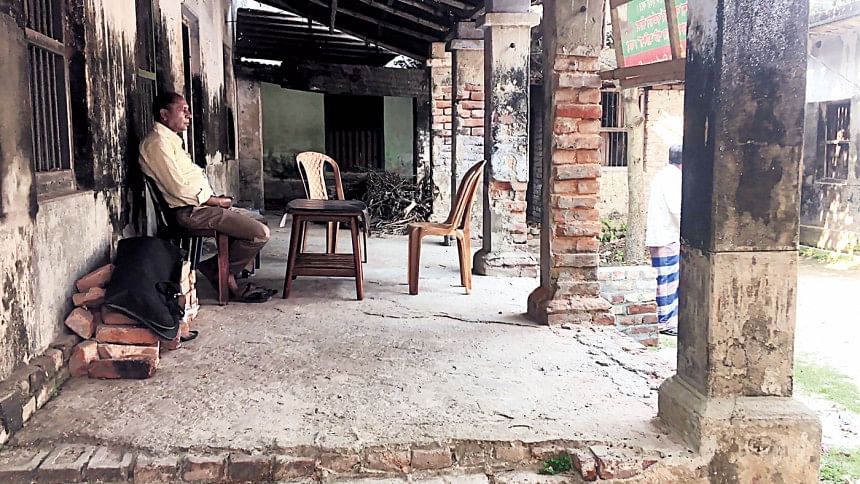
"This can't be said; I can't say it. You know what they did to the women."
Niva Rani Paul, now in her 70s, was recalling what is the most horrific episode of her life and also of Ataikula village in Naogaon's Raninagar upazila.
It was on April 25, 1971.
"The Punjabis had surrounded our village. I was with my husband. Bursting into our room, three men picked up my husband. I was then a mother of two children. Two men held me tight; I could not run away," she said.
For this conversation, she took this correspondent to one of her neighbours' house in the village, where only Hindu communities live. Its inhabitants had emptied the house on her request.
While narrating the event that shattered her life five decades back, shehung her head with her eyes welling up from time to time.
Niva is among at least 35 Hindu women of the village who were listed by local authorities in September last year as tortured and raped by the Pakistani forces during the Liberation War.
He husband, Akanda Chandra Paul, is one of the 52 men massacred in the village on April 25.
In 2019, the government recognised 10 of the 35 women and awarded them with the title of Birangana. Four of the 10 died before the recognition, and only one, Bani Rani Paul, received the guard of honour upon her death, four months after the recognition, villagers said.
Of the other 25, eight have already died, and most of the remaining 17 are not doing too well as their ancestral profession of pottery is dying out.
Yet they are mostly unwilling to speak up for their right when an official recognition could earn them some state allowance or support at this age, especially when the country is celebrating the Golden Jubilee of Independence.
Niva Rani too is struggling, along with her two sons, as they survive on pottery, which was also the profession of her husband.
According to historian Prof Muntassir Mamoon,four lakh women were tortured and raped during the war but the government acknowledges only two lakh, mostly Hindus.
"Many of these great women also do not speak up due to social stigma," Prof Muntassir, also the author of "Birangana 1971", also said.
He suggested the government should speed up the process of recognising all the women who made sacrifices during the war and at the same time, and adopt a strategy to keep their identities secret where it is necessary.
In October 2015, the government in line with a High Court ruling decided to recognise the Biranganas as women freedom fighters.
Officially recognised Biranganas are entitled to a monthly allowance of Tk 12,000 and a special quota in government jobs and benefits for their children and grandchildren.
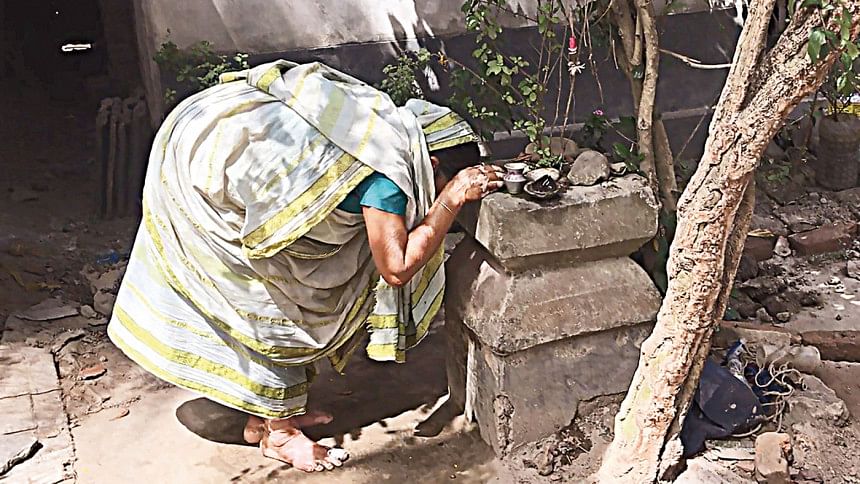
In the last five years, the Ministry of Liberation War Affairs recognised only 422 Biranganas as women freedom fighters.
The War Crimes Facts Finding Committee led by Dr MA Hassan recorded that at least 1.62 lakh women were raped and another 1.31 lakh Hindu women went missing during the war.
This correspondent spoke to two other women in Ataikula village, who were brutalised by the occupation forces.
Kali Rani Paul, who has been recognised as a Birangana, said the Pakistanis also killed her husband Anil Chandra Paul. "I was pregnant. They hit me in the belly with a rifle butt. I had to give birth to a dead child."
Sujola Rani Paul, still unrecognised, said she lives on working as a house help. "The days after the massacre have been tough. We passed many days without food, unable to cook at our homes."
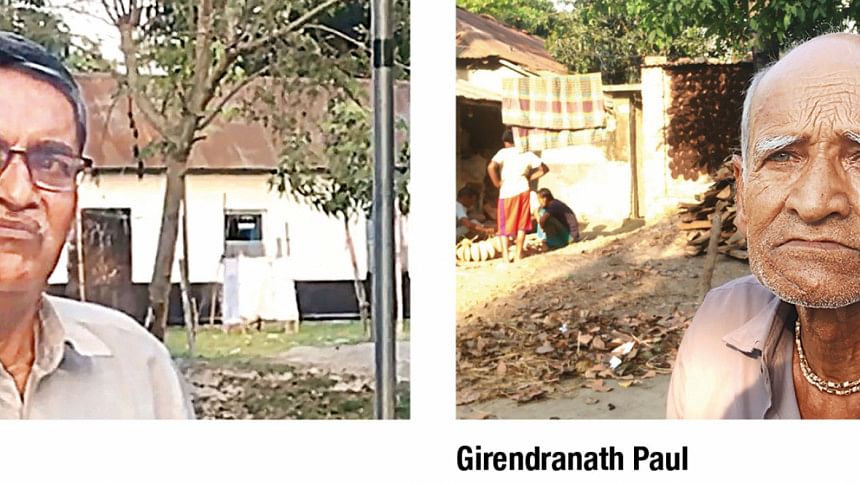
MARTYRS UNRECOGNISED TOO
Like the Biranganas, the 52 martyrs and eight survivors of Ataikula massacre remain unrecognised.
"I went to many places since the war for this recognition," said Girendranath Paul, who survived the mass killing with bullet wounds in his face, right hand, and leg.
Goutam Paul, son of martyr Gobinda Charan Paul, also had long been fighting for the recognition of the victims.
Finally, the Prime Minister's Office in March 2015 ordered recognising the martyrs. It then took five years, until October last year, for the Jatiya Muktijuddha Council to complete the scrutiny of the martyrs' families, he said.
"We hope the official recognition will come shortly," said Goutam.
ATAIKULA MASSACRE
Some 70km from Rajshahi city, Ataikula is by the river Chhoto Jamuna.
In 1971, this river was the only communication to the village, where around 115 Hindu families of Paul, Sutradhar, and Saha lived.
Among them, some 15 families were affluent farmers while the others were either small farmers or potters who used to manufacture brick tiles and clay materials.
On April 25, some 150 Pakistani forces and their collaborators reached Ataikula by six boats and raided the village for eight hours starting from 9:00am.
They gathered 60 males at the house of one Jogendranath Paul.
They divided the males into two groups -- those who agreed to provide money and gold willingly, and those who were unable to give any. They opened fire on the second group first and then on the other group with light machine guns.
The 52 people shot to death were buried together near Jogendranath's house after the army and collaborators left.
It was not possible to observe the Hindu rituals for the funeral of the dead as the houses were burned and almost everything was looted by the occupation forces.
Eight men survived, some with bullet wounds and some unhurt.
Pradyut Paul, then an SSC candidate, who lost his father, an uncle, and three brothers in the mass killing, is one of the survivors.
"I stayed low avoiding the bullets," Pradyut said, adding he was among the group who had no money to give to the Pakistanis.
"Hundreds of bullets flew over my head. A wounded man fell over me. He asked me to remain silent," he added.
"The place was flooded with blood and we saw blood draining into the river. The Chhoto Jamuna turned all red."
Pradyut said the Pakistani military men were divided over the tortures and rapes.
"The attackers included Punjabis, Biharis, and those who were from Baluchistan. The Beluch ones were against rapes, torture, and robbery."
He heard local Bangalee razakars gossiping about this divide among the Pakistani officials.
"We were here for war. But how can this be a war? Instead of fighting a war, we are torturing these simple unarmed villagers," Pradyut quoted a Beluch officer as telling a Punjabi officer.
"The Punjabi officer then shut him up saying it was an order from the high-ups."
Before the killing, the Pakistani military sought suggestions from their headquarters over radio.
"Ataikula is not a village, rather a town of big buildings. All dwellers here are malauns [derogatory term referring to Hindus] who have money and gold," he quoted a Pakistani official as speaking over the radio.
The male voice from the other side ordered killing everyone, said Pradyut, who understands Urdu.
Before gathering the men for killing, the Pakistani forces kept the women confined to their homes, Pradyut said.
"We know none of our adult women were spared. Some committed suicide, others attempted to. Many died unmarried."
The mass killing and the torture of the women of Ataikula and elsewhere moved the district's youths, said Prof Md Shariful Islam Khan, a freedom fighter and retired government principal from neighbouring Durgapur village.
"Most youths like me in the district later left our homes to join the war to free the motherland," he said.
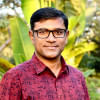
 For all latest news, follow The Daily Star's Google News channel.
For all latest news, follow The Daily Star's Google News channel. 


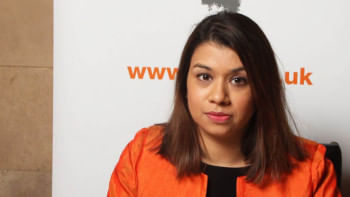
Comments